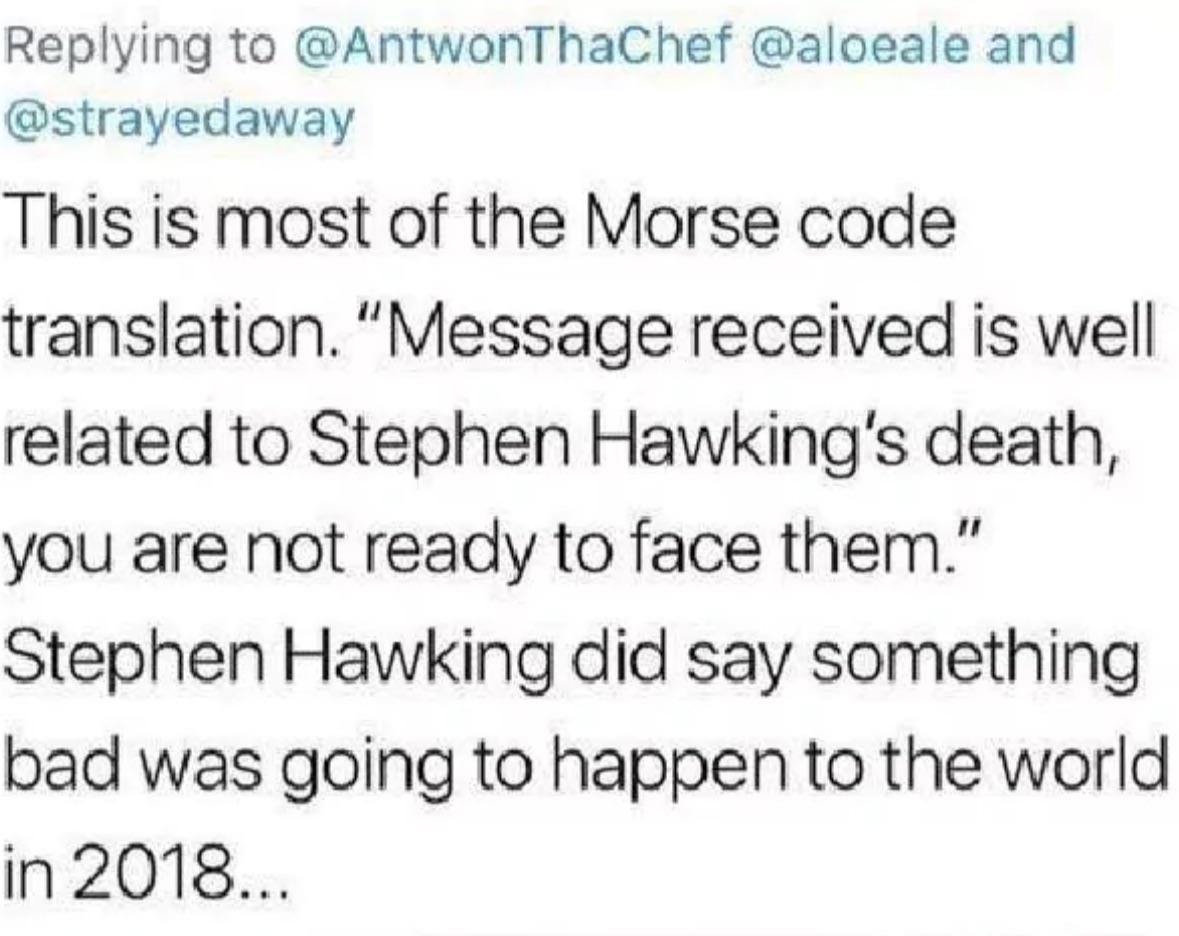
Moments before he died, Stephen Hawking warned of an imminent alien invasion and claimed the universe would end shortly afterwards.
Earlier in March, shortly after Stephen Hawking submitted a scientific paper that laid out how our Universe would end (and how another would take its place), a mysterious voicemail was left on various Twitter user’s cellphones, which included Morse code from Professor Hawking.
The code is said to be in the NATO phonetic alphabet and has been translated as: “S Danger SOS it is dire for you to evacuate be caution they are not human 042933964230 SOS Danger SOS.”
This is what it says, pay close attention that there’s an “S” right before danger, meaning that’s the recording is on a continuous loop, it’s not a message set to play once it goes to voicemail pic.twitter.com/G77xkLVuKh
— Uzumaki (@jvstinfox) March 15, 2018
Others received a longer version of the message (below):
“This is not a test, this is not a joke. Over the past several years we have been wanting to send an automated voice message to people who understand and are not afraid.
“One message at a time will make many know the truth. The truth that other biological beings have been walking the supreme creation that sustains life. Earth.
“But as chaos comes to your planet we must show ourselves to prove that there are different ways to keep peace. Many do not agree with what we say, so they may hunt us down.
“We will make ourselves known to the best of our utmost capabilities. Clear your air space for safe consequences.”


Several users deciphered the Morse code and got this: “They [aliens] are taking over”, and a mysterious line about the late scientist Stephen Hawking, which read: “The message received is well related to Stephen Hawking’s death, you are not ready to face them.”
Two weeks before these messages, Stephen Hawking had submitted a scientific paper for peer review which warned that our Universe was about to end.
Vice reports: The working paper, submitted for publication two weeks before his death, according to the U.K.’s Sunday Times, may turn out to be a culmination of the renowned physicist’s life’s work. In his research, Hawking sought to solve problems he’d been pondering for the past 35 years — ever since he published his theory of how the universe expanded following the Big Bang.
The paper proposes that evidence of a multiverse is detectable in the background radiation of our own universe — and that that evidence could, in theory, be found and measured. If we do, in fact, live in a “multiverse,” our own cosmos is just one of many universes out there. Taken together, the multiverse, made up of all its individual universes, would comprise all of space, time, matter, and energy.
Though Hawking’s last paper could provide optimism for those hoping to test for the existence of multiple universes, his research also includes a bleak prediction: Our universe will eventually go dark once all its stars run out of energy.
The paper, titled “A Smooth Exit from Eternal Inflation,” is under peer review for publication in an unnamed major scientific journal.
In 1983, Hawking and his colleague Jame Hartle co-authored a paper describing the inflation that took place after the Big Bang — the rapid expansion of space that created the universe. The theory relied on the existence of other universes, formed at the same time as ours during the Big Bang. The theory, however, couldn’t be tested.
But testing the idea through experimentation was exactly what Hawking sought to do. “We wanted to transform the idea of a multiverse into a testable scientific framework,” said Thomas Hertog, the co-author of the paper and Hawking’s mentee, according to the Sunday Times. If Hawking were still alive, the paper might have even won him his first Nobel Prize, other researchers said. The award, however, isn’t given posthumously.
But not everyone agrees the working paper’s findings are groundbreaking.
“His very last paper sought to rescue some predictiveness, but the arguments are as yet unconvincing,” said Professor Neil Turok, director of Canada’s Perimeter Institute and a friend of Hawking, told U.K.’s The Times.
Hawking died peacefully in his home on March 14 at the age of 76 due to complications associated with the neurodegenerative disease he’d fought for most of his adult life, amyotrophic lateral sclerosis.
Source Article from http://yournewswire.com/stephen-hawking-alien-invasion/
Related posts:
Views: 0
 RSS Feed
RSS Feed

















 March 23rd, 2018
March 23rd, 2018  Awake Goy
Awake Goy 
 Posted in
Posted in  Tags:
Tags: 
















